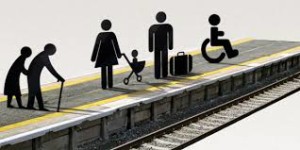Railway stations, access for disabled travellers
A friend alerted me to this article from the Independent.

Railway stations and access for the disabled
It describes how funding to improve access for disabled passengers at railway stations is being slashed. The United Kingdom considers itself to be a civilised country but so many train stations are not disabled friendly, they are inaccessible?
I won’t paraphrase the article. Instead I will chuck in a few of my own thoughts.
Who else uses disabled access?
Providing access at railway stations for the disabled helps a huge range of people, as well as giving assistance for the disabled. Here are a few examples. How does a single parent cope with a baby in a buggy? How does an able bodied elderly person cope when travelling with a heavy suitcase? How does a musician cope when carrying a double bass musical instrument?
Some stations are being changed
I could easily think of lots more examples but I will not bore you. I do understand that expenditure or spending at the moment needs to be looked at very carefully. Disabled people want to return to work but how is this possible when so many railway stations used for commuting do not have step free access? Some of the railway stations that do not have step free access are astonishing.
Ways round the problem
I live in Berkhamsted, London Midland is the train line serving the town; the station will soon be step free as will Hemel Hempstead. Even so there are still several stations on this London Midland line that are used by many commuters that will still not be step free; stations such as Tring, Bushey and Kings Langley There are alternative actions so the disabled can still travel to these stations but it means using taxis that are paid by the train company.
A matter of priority
Yes there are many important services that are not getting the funds they would like and it is all a matter of priority. I do feel that disabled access at railway stations will help so many more people than just the disabled. There are many hidden benefits and in the grand scheme of things it does not require very much money.
What is your take?
Should funding to make stations accessible be reduced? Do please tell me what you think. Use the comments section below
Associated stories
Article in the Independent The article that prompted me to write this post



I travel on the Piccadilly Underground line to travel to Central London. There is a lift from street/Booking Hall Level to platform at OAKWOOD, but the carpark is tiny and invariably full by the end of the rush hour. COCKFOSTERS does NOT have a lift but the car park there is enormous and there are always spaces. Why did London Transport NOT spend the money used at Oakwood on a lift a Cockfosters?
Hello MC,
I wish I understood the thinking that goes on within TfL.
Within the grand scheme of things I do not think it would be outrageously expensive to build a bridge and lift at Cockfosters Underground station, I have had a quick look at the satellite view on Google maps, it is above ground so would be cheap. Interesting, Google maps shows a picture of disabled parking spaces at Cockfosters station
What The Independent is reporting as if sensational news is that the government has allocated £100m for Access for All station improvements in Network Rail’s “control period 5”. This information has been public knowledge since 2012, so the reaction of Mrs Creagh, the Opposition spokesman, is cynical and opportunist in presenting good news as bad; either that or she has not being doing her job properly by paying attention to announcement made for the past two years by successive transport ministers, including Norman Baker MP.
I am chairman of a voluntary group that supports disabled travellers in a small part of the Thames valley on the Oxfordshire-Berkshire border. Like you, I wish there was more money for disabled access and for some of it to be allocated to our busy local station, which serves a population with an exceptionally high age profile and a disproportionately large number of wheelchair users. We also have the police national rehabilitation centre nearby, which treats many disabled police officers each year and has a rail-first travel policy. So I am fully in favour of shaming ministers into giving disabled access higher priority when railway funds are allocated; but I see this particular political statement, and the way it is reported, as a punch as below the belt. – John Boler, chairman, MIGGS, the Mobility Issues Group for Goring and Streatley.